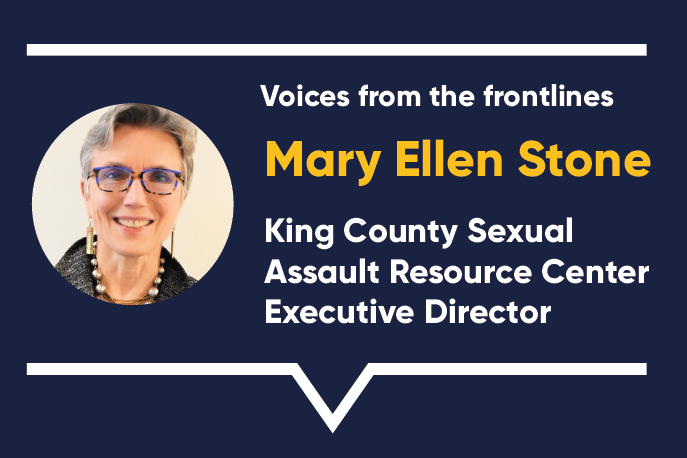In our third installment of our Voices from the Frontlines series, we recently spoke to Seattle’s Mary Ellen Stone, Executive Director of the King County Sexual Assault Resource Center (KCSARC), the largest sexual assault organization in the Pacific Northwest. As a leader in the sexual violence prevention space for more than 40 years, Mary Ellen shares her insights on how COVID-19 is impacting survivors and what support they need at this time. She also shares her wisdom on the importance of mental health care during a pandemic, an especially timely topic with May being Mental Health Awareness Month. This interview has been edited for clarity and length.
Washington State was one of the first coronavirus hotspots in the United States. How have you seen the pandemic impact survivors?
In the aftermath of trauma, survivors are already feeling stressed, anxious, and depressed. They are dealing with PTSD symptoms such as anxiety, depression, and flashbacks related to their assault. On top of all that when you overlay the current situation, it is a really difficult time for them.
Local organizations like KCSARC face challenges in serving victims and their families during this time. We are adapting our service delivery model. We have switched over to telehealth to provide therapy, and we know every survivor we serve has unique circumstances and needs. Talking with a therapist via HIPAA-compliant Zoom works for some people, if they have a space where they can be alone and have privacy, but it doesn’t work as well for the mom who doesn’t have a place to go in the house to be away from others she is taking care of all day long.
And as the majority of our therapy clients are children and youth, we have developed tools to keep them engaged during an online session.
With May being Mental Health Awareness Month, therapy is such an important topic. How has KCSARC provided support to survivors as they seek healing and justice in the midst of a pandemic?
Mental health services are critical for survivors and, when coupled with ongoing specialized sexual assault support and advocacy, can provide a great deal of stability in these uncertain times.
In addition to being a Washington State Accredited Sexual Assault Program, we are a licensed mental health provider. All our services are evidenced-based treatments — for example, Trauma-Focused, Cognitive Behavioral Therapy (TF-CBT), and Prolonged Exposure (PE) that have proven effective in addressing trauma in a wide variety of situations. KCSARC staff are closely connected to the Latinx community, are multicultural, and bilingual in Spanish. Our therapists recently co-authored an article for the International Society for Traumatic Stress Studies (ISTSS) StressPoints Newsletter demonstrating how evidenced-based treatments can be successfully adapted to the Latinx community.
When it comes to seeking justice, our knowledge of how to help people dealing with severe stress coupled with how to navigate the criminal justice system work is especially helpful to survivors right now. Even with many aspects of the system essentially shut down, we can still help a survivor navigate their options and reporting. We recently had a situation where a father was trying to help his daughter make a report to police about a rape that happened a couple months ago. They went to make a police report, and they were dismissed. They were told it’s not an emergency, it’s not urgent, and we’re not going to take the report. This can be devastating and discouraging for survivors coming forward, and that’s why they need advocates like us who are on their side and always willing to listen.
We noticed you had a lot of resources for parents and families on your site. Why is this important?
About half of the victims we work with are children and teens. Parents and families are critical to the child or teenager’s healing journey, and we want to make sure that they are supported, too. A lot of our programming is about helping parents be an open resource for their kids on topics that can be hard to talk about, such as boundaries and consent.
What do you want survivors to know right now?
We’re here. We’ll continue to be here. That’s not changing. Services and support may look a little different, but we’re still here for you. What happened to you is not right, and you are not alone. You have the right to get help, to get justice, to know what’s going on, and to feel safe. We recently ran ads on our local public radio stations to communicate that message, because we know during these times, people are concerned about who’s available for services.
How can people support survivors and organizations like yours during this time?
– Familiarize yourself with resources that are available in your community for survivors and families, and be prepared to share what you know.
– Support local resources with donations. Any amount truly makes a difference.
– Contact your elected officials. Please call federal and state elected officials and tell them to continue supporting resources for survivors and providers. We’re a critical piece of the safety net, and elected officials need to hear that.
– Show gratitude. A simple gesture such as a phone call to your local rape crisis center to say “thank you for being there” really goes a long way and is always appreciated by our staff.

